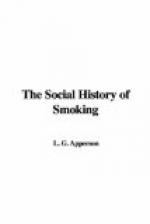The observant visitor to the promenade concerts annually given in the Queen’s Hall, Langham Place, will notice that but one small section of the grand circle is reserved for non-smokers, while smoking is freely allowed (with no absurd ban on the friendly pipe) in every other part of the great auditorium—floor, circle and balcony.
There are still some people who share the Duke of Wellington’s delusion that smoking promotes drinking, although experience proves the contrary, and historic evidence, especially as regards drinking after dinner, shows that it was the introduction of the cigar, followed by that of the cigarette, which absolutely killed the old, bad after-dinner habits. The Salvation Army do not enforce total abstinence from tobacco as well as from alcoholic drinks as a condition of membership or soldiership, but a member of the Army must be a non-smoker before he can hold any office in its rank, or be a bandsman, or a member of a “songster brigade.” And in other religious organizations there are yet a few of the “unco’ guid” who look askance at pipe or cigarette as if it were a device of the devil. But the numbers of these misguided folk become fewer every year.
Smoking in the dining-room after dinner is now so general that people are apt to forget that this particular development is of no great age. It is not yet, however, universal. A valued correspondent tells me that he knows a house “where tobacco is still kept out of the dining-room, and smoke indulged in elsewhere after wine. This old-fashioned habit must now be pretty rare.”
The chief legitimate objection to cigarette smoking was well stated some years ago by the late Dr. Andrew Wilson. “I think cigarettes are apt to prove injurious,” he said, “because a man will smoke far too much when he indulges in this form of the weed, and because I think it is generally admitted that cigarettes are apt to produce evil effects out of all proportion to the amount of tobacco which is apparently consumed.” Excess can equally be found among cigar and pipe-smokers. The late Chancellor Parish, in his “Dictionary of the Sussex Dialect,” tells a delightful story of a Sussex rustic’s holiday—“May be you knows Mass [Master, the distinctive title of a married labourer] Pilbeam? No! doaent ye? Well, he was a very sing’lar marn was Mass Pilbeam, a very sing’lar marn! He says to he’s mistus one day, he says, ’tis a long time, says he, sence I’ve took a holiday—so cardenly, nex marnin’ he laid abed till purty nigh seven o’clock, and then he brackfustes, and then he goos down to the shop and buys fower ounces of barca, and he sets hisself down on the maxon [manure heap], and there he set, and there he smoked and smoked and smoked all the whole day long, for, says he ’tis a long time sence I’ve had a holiday! Ah, he was a very sing’lar marn—a very sing’lar marn indeed.”




